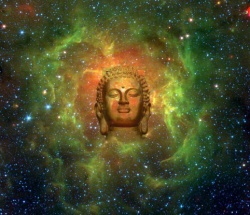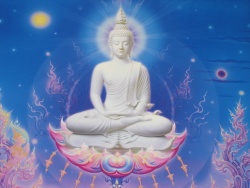10 Precepts (Sila)
The Flower Garland (Avatamsaka) Sutra says:
- Bodhisattvas that abide in this stage are by nature completely free from the killing of living things. They are without brutality or the need to use weapons, and they do not harbor feelings of anger and resentment. With humility, they are full of good will and forgiveness towards living beings, only wishing for their welfare. These Bodhisattvas do not even have thoughts of distressing living beings, much less think of turning these thoughts into doing actual harm.
- By nature Bodhisattvas do not steal. They are always perfectly satisfied with their own possessions and, with kindness and good will towards others they do not encroach upon their belongings. If they think about the possessions of others, they never have a thought of taking them. They would never even think of taking a single blade of grass that was not given to them, much less any other possession.
- By nature Bodhisattvas do not commit acts of sexual immorality. They are satisfied with their own spouses and do not seek those of others. They do not bear any thoughts of desire or lust for others’ spouses or lovers, much less act on these thoughts or have sexual relations with them.
- By nature Bodhisattvas do not speak falsely. They speak the truth, saying what is so and what is appropriate to the occasion. Even in their dreams they do not desire to use words to deceive or cover up the truth, much less actually do so consciously.
- By nature Bodhisattvas do not have a double tongue. They do not wish to sow dissension among living beings, or to distress or harm them in any way. They do not accuse others to put them down, nor do they speak behind their back. They do not try to break up those who are together and they do not try to increase the rift between those that are divided. They do not rejoice or take pleasure in divisiveness, and do not use speech that will cause it, whether it is true or not.
- By nature Bodhisattvas do not have a hateful mouth. This is speech that is poisonous and injurious, coarse and rude, hurtful to others, speech that makes others angry and hateful, and speech that is openly or covertly mean, cheap and low, unpleasant to hear, angry and hateful, like a fire burning the mind, tied up in resentment, hot and distressful, impossible to care for or like, and capable of harming themselves and others. Having completely forsaken this speech and freed themselves from it, they always speak with words that are comforting and kind, soft and gentle, pleasing and nice to hear. They give joy to those that hear them and skillfully reach people’s heart. Their speech is graceful and refined, authoritative, loved and enjoyed by all people, and makes the body and mind rejoice.
- By nature Bodhisattvas do not have dissembling speech that is silken and flowery. Their speech of is always intentional and judicious, appropriate to the occasion, truthful, meaningful, logical and reasonable, carefully considered, thoughtful and well measured. Even when telling a joke, Bodhisattvas are always intentional and judicious, and they are never prattling nonsense.
- By nature Bodhisattvas are without greedy desire for the wealth or belongings of others. They do not seek or wish for it.
- By nature Bodhisattvas are free from anger and hatred. For living beings they always inspire a mind of kindness and desire to benefit, and they offer empathy, joy, friendship, and acceptance. They are ever free of anger, resentment, malice and the heat of distress. They are always considerate and act with benevolence, kindness and the desire to care for and be of benefit to others.
- And, being free of false views, Bodhisattvas abide in the True Path of Enlightenment. Not practicing in divination, fortune-telling or the making of evil hexes, their views are straight and true, and without deception or flattery. Their resolute faith is in the Buddha, the Dharma and the Sangha.
Bodhisattva Mahasattvas unceasingly keep and embrace the tenfold path of good karmic deeds like this and make this thought: “No living beings fall into the destiny of hell without the making of the ten karmic deeds that are not good, and therefore I must cultivate the true practice for myself and encourage others to cultivate the true practice as well.”
Why is this so? This is because it is impossible to make others cultivate it if one does is unable to cultivate it oneself.
These Bodhisattva Mahasattvas further make these thoughts:
- The paths of the ten karmic deeds that are not good cause the spiritual realms of hell, brutality and hunger.
- The paths of the ten good karmic deeds cause the spiritual realms of personality and heaven, up to the crown of existence (the Akanishta Heaven, the highest of the 25 states of existence in the threefold realm of Life & Death).
- This path of the higher grade of ten good karmic deeds is further cultivated with the wisdom of spiritual learning. But in being narrow-minded, fearing the threefold realm, being deficient in compassion and only understanding after hearing from others, one attains the vehicle of the spiritual disciple (Sravaka).
- This path of the higher grade of ten good karmic deeds is further cultivated and purified so that one awakens oneself without the teachings of others. Being inadequate in the skillfulness of ways and means but very deeply understanding the causality of spirituality (the Dharma) one attains the vehicle that is the Solitary Awakening (Pratyekabuddha).
- This path of the higher grade of ten good karmic deeds is further cultivated and purified so that the one is broadminded and limitless, full of compassion and empathy, skillful in the management of ways and means, inspired by great vows, and not forsaking living beings. One seeks the great wisdom of the Buddhas, the Bodhisattva stages of purity and healing, and the pure cultivation of all the perfections (Paramitas). One attains the broad and great practice of the Bodhisattva.
- With the supreme path of the highest ten good karmic deeds there are all kinds of purity up to the realization of the ten spiritual powers, the four kinds of fearlessness and the attainment of all of the enlightenment of the Buddhas. Therefore I now practice these ten good deeds and make all purified and fulfilled
The Bodhisattvas must study the ways and means like this.
These Bodhisattva Mahasattvas also make this thought: "The path of these ten bad deeds cause hell in the worst case, brutality in the middle case, and hunger in the least case."
- The sin of killing living beings can make living beings fall into hell, brutality and hunger. In human life, two kinds of retribution are attained: #1 A short life #2 Much sickness
- The sin of stealing can make living beings fall into the three evil roads. In human life, two kinds of retribution are attained: #1 Poverty #2 Shared possession of property and lack of ownership
- The sin of sexual immorality can make living beings fall into the three evil roads. In human life, two kinds of retribution are attained: #1 An unfaithful spouse #2 Untrusting followers
- The sin of false speech can make living beings fall into the three evil roads. In human life, two kinds of retribution are attained: #1 Much slander #2 The deception of others
- The sin of a double tongue can make living beings fall into the three evil roads. In human life, two kinds of retribution are attained: #1 Disobedience & loss of followers #2 Intimates and family that are corrupt and evil
- The sin of an evil mouth can make living beings fall into the three evil roads. In human life, two kinds of retribution are attained: #1 Always hearing evil voices #2 Arguments
- The sin of silken, flowery speech can make living beings fall into the three evil roads. In human life, two kinds of retribution are attained: #1 Lack of people’s trust #2 Lack of clarity in one’s speech
- The sin of greedy desire can make living beings fall into the three evil roads. In human life, two kinds of retribution are attained: #1 Dissatisfaction #2 Endless ambition
- The sin of anger and hatred can make living beings fall into the three evil roads. In human life, two kinds of retribution are attained: #1 Always suffering other people’s merits and defects #2 Constantly suffering other people’s distress and malice
- The sin of false views can make living beings fall into the three evil roads. In human life, two kinds of retribution are attained: #1 Living in schools of false views #2 Minds that are crooked and deceitful
The ten bad karmic deeds are able to produce this great host of limitless and boundless sufferings. Therefore Bodhisattvas make this thought. “I must completely forsake the path of the ten bad deeds and abide with peace and contentment in the garden of the Dharma by means of the ten good deeds. With oneself abiding in its midst, one encourages others to do so as well.



